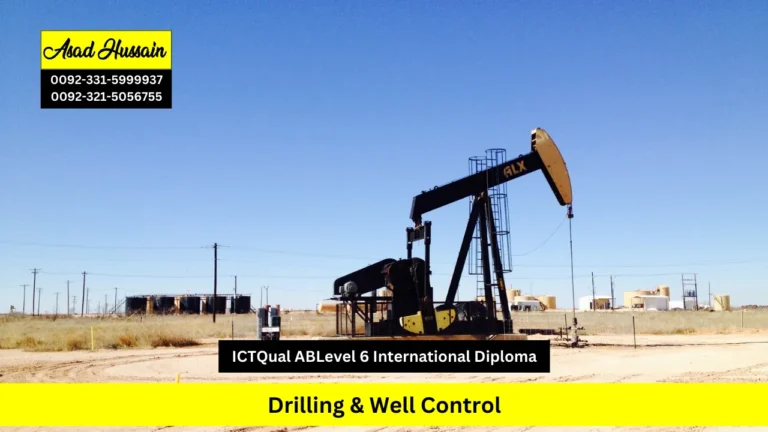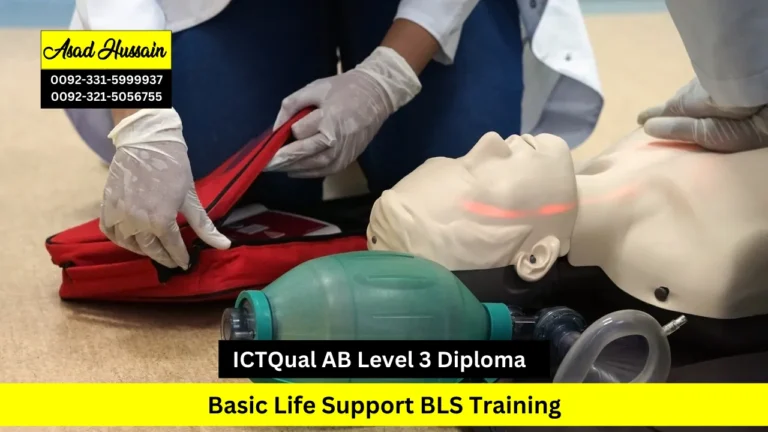Mechanical engineering projects form the backbone of industries ranging from manufacturing and energy to automotive and aerospace. Effective management of these projects ensures operational efficiency, cost control, timely delivery, and compliance with quality and safety standards. The ICTQual AB Level 6 International Diploma in Project Management in Mechanical is a comprehensive program designed to equip learners with the advanced knowledge, practical skills, and strategic insight needed to lead and manage mechanical engineering projects successfully.
ICTQual ABLevel 6 International Diploma in Project Management in Mechanical covers essential aspects of project management, including project planning, scheduling, budgeting, risk management, quality assurance, health and safety, stakeholder communication, and the application of mechanical engineering principles. Learners will gain hands-on experience in managing complex projects, coordinating teams, and optimizing resources to achieve successful outcomes.
Through a combination of theoretical knowledge and practical application, participants will develop competencies in strategic decision-making, project monitoring, and leadership. Graduates of this program will be prepared for senior roles in mechanical project management, consultancy, manufacturing operations, and engineering organizations globally. Completing this course enhances professional credibility, strengthens career prospects, and ensures the ability to deliver mechanical projects efficiently, safely, and sustainably.
Program Highlights
Study Units
Year 1 – Foundation in Mechanical Project Management
- Principles of Project Management
- Introduction to Mechanical Engineering Projects
- Mechanical Materials and Methods
- Project Planning and Scheduling
- Risk Assessment and Management
- Health, Safety, and Environmental Awareness
- Project Communication and Stakeholder Management
- Mechanical Technology Fundamentals
- Financial Management in Projects
- Quality Assurance and Control
- Legal and Regulatory Frameworks in Mechanical Engineering
- Professional Ethics and Conduct
Year 2 – Intermediate Mechanical Project Management Practices
- Advanced Project Planning Techniques
- Resource Management and Allocation
- Project Cost Estimation and Budgeting
- Mechanical System Design Principles
- Contract Management in Mechanical Projects
- Project Risk Analysis and Mitigation
- Leadership and Team Management
- Mechanical Site and Workshop Management
- Sustainability and Environmental Management
- Project Monitoring and Reporting
- Problem-Solving and Decision-Making in Projects
- Communication and Negotiation Skills
Year 3 – Advanced Mechanical Project Management and Strategic Leadership
- Strategic Project Management in Mechanical Engineering
- Advanced Mechanical System Design
- Industrial Project Management
- Innovation in Mechanical Projects
- Advanced Risk and Crisis Management
- Procurement and Supply Chain Management
- Leadership in Mechanical Engineering Projects
- Advanced Project Control and Performance Measurement
- Project Governance and Compliance
- Research Methods and Project Analysis
- Capstone Project in Mechanical Project Management
- Professional Development and Career Planning
To ensure learners are fully prepared for the ICTQual AB Level 6 International Diploma in Project Management in Mechanical, specific entry requirements have been established. These requirements ensure that candidates possess the necessary educational background, professional experience, and language proficiency to engage effectively with advanced course content and apply mechanical project management principles in real-world scenarios.
Age Requirements
- Applicants must be 18 years or older to enroll in ICTQual ABLevel 6 International Diploma in Project Management in Mechanical.
- Mature learners over 21 years are encouraged, particularly those seeking professional growth in mechanical project management.
Educational Requirements
- Candidates should hold a Level 5 qualification or equivalent in mechanical engineering, engineering management, project management, or a related discipline.
- Recognized diplomas, technical certifications, or prior completion of relevant engineering programs may also be considered.
Professional Experience
- Relevant work experience in mechanical engineering projects, production, or project coordination is preferred.
- Practical experience in planning, budgeting, resource allocation, or team management enhances the application of course concepts.
English Language Proficiency
- Non-native English speakers must demonstrate proficiency through recognized tests such as IELTS 6.0 or equivalent.
- Effective English communication skills are essential for understanding course materials, completing assessments, and engaging in professional project documentation.
Meeting these entry requirements ensures learners are fully prepared to maximize the benefits of the course. By enrolling in this diploma, participants will gain the knowledge, practical skills, and professional credibility required to manage mechanical engineering projects efficiently, lead diverse teams, and contribute strategically to organizational and industrial success globally.
The ICTQual AB Level 6 International Diploma in Project Management in Mechanical equips learners with comprehensive knowledge and practical skills to excel in mechanical project management. By the end of this program, participants will have gained advanced expertise in planning, executing, and leading mechanical engineering projects across diverse industries, while meeting international standards and professional expectations.
Year 1 – Foundation in Mechanical Project Management
Principles of Project Management
- Understand core project management methodologies and frameworks applicable to mechanical engineering.
- Apply project lifecycle concepts to plan and initiate mechanical projects effectively.
- Evaluate project objectives, constraints, and deliverables against organizational goals.
Introduction to Mechanical Engineering Projects
- Recognize different types of mechanical engineering projects and their operational contexts.
- Analyze project requirements, objectives, and expected outcomes.
- Develop foundational project documentation and reporting skills.
Mechanical Materials and Methods
- Identify properties and applications of common mechanical materials.
- Select appropriate materials and methods for specific project needs.
- Apply basic mechanical engineering principles to practical tasks.
Project Planning and Scheduling
- Develop project schedules using standard tools and techniques.
- Allocate tasks and resources to meet project milestones.
- Monitor and adjust plans to ensure timely project delivery.
Risk Assessment and Management
- Identify potential risks in mechanical projects and assess their impact.
- Formulate risk mitigation and contingency plans.
- Evaluate risk management strategies for effectiveness.
Health, Safety, and Environmental Awareness
- Demonstrate understanding of health and safety regulations in mechanical projects.
- Apply safe work practices in mechanical workshops and project sites.
- Assess environmental implications of project activities.
Project Communication and Stakeholder Management
- Communicate project information effectively to stakeholders.
- Develop stakeholder engagement strategies.
- Resolve communication challenges in project teams.
Mechanical Technology Fundamentals
- Understand fundamental mechanical systems, tools, and equipment.
- Apply basic engineering principles to practical project tasks.
- Analyze technical data to support decision-making.
Financial Management in Projects
- Interpret project budgets, costs, and financial statements.
- Apply basic financial management techniques to project planning.
- Monitor expenditure to ensure cost efficiency.
Quality Assurance and Control
- Understand quality standards relevant to mechanical engineering projects.
- Apply quality control techniques in project execution.
- Evaluate project outputs against predefined quality criteria.
Legal and Regulatory Frameworks in Mechanical Engineering
- Understand legal obligations and compliance requirements.
- Apply regulatory standards in mechanical project planning and execution.
- Assess the impact of legal frameworks on project decisions.
Professional Ethics and Conduct
- Demonstrate ethical decision-making in mechanical project management.
- Apply professional standards in workplace interactions.
- Promote integrity and accountability in all project activities.
Year 2 – Intermediate Mechanical Project Management Practices
Advanced Project Planning Techniques
- Develop detailed project plans incorporating dependencies and critical paths.
- Use advanced software tools for project scheduling and resource allocation.
- Analyze and optimize project workflows for efficiency.
Resource Management and Allocation
- Identify and allocate human, material, and technological resources.
- Monitor resource utilization to optimize project performance.
- Resolve conflicts and constraints in resource management.
Project Cost Estimation and Budgeting
- Prepare accurate cost estimates for mechanical projects.
- Develop and manage project budgets effectively.
- Monitor financial performance against projected costs.
Mechanical System Design Principles
- Apply design principles to develop mechanical systems.
- Integrate design considerations with project objectives and constraints.
- Evaluate designs for functionality, safety, and efficiency.
Contract Management in Mechanical Projects
- Understand key elements of contracts and legal obligations.
- Manage contracts with suppliers, subcontractors, and stakeholders.
- Resolve disputes and enforce contractual agreements effectively.
Project Risk Analysis and Mitigation
- Conduct quantitative and qualitative risk analyses.
- Develop mitigation strategies for high-impact risks.
- Monitor risk management plans throughout project execution.
Leadership and Team Management
- Lead multidisciplinary project teams effectively.
- Apply leadership techniques to motivate and manage teams.
- Resolve interpersonal and organizational challenges within teams.
Mechanical Site and Workshop Management
- Supervise mechanical workshops and on-site operations.
- Apply safety, quality, and operational standards on-site.
- Optimize workflow efficiency in mechanical project environments.
Sustainability and Environmental Management
- Integrate sustainable practices into project design and execution.
- Evaluate environmental impact and implement mitigation measures.
- Promote sustainability in mechanical engineering projects.
Project Monitoring and Reporting
- Use performance metrics to track project progress.
- Prepare comprehensive project reports for stakeholders.
- Adjust plans based on monitoring outcomes to achieve objectives.
Problem-Solving and Decision-Making in Projects
- Analyze complex project challenges and propose solutions.
- Apply structured decision-making tools to mechanical projects.
- Evaluate outcomes and implement corrective actions.
Communication and Negotiation Skills
- Apply professional communication techniques in project contexts.
- Conduct negotiations with clients, suppliers, and stakeholders.
- Resolve conflicts and achieve mutually beneficial project outcomes.
Year 3 – Advanced Mechanical Project Management and Strategic Leadership
Strategic Project Management in Mechanical Engineering
- Develop strategic plans aligned with organizational goals.
- Apply advanced project management methodologies to large-scale projects.
- Evaluate strategic outcomes and performance metrics.
Advanced Mechanical System Design
- Integrate innovative technologies into mechanical system design.
- Assess designs for efficiency, safety, and sustainability.
- Manage design modifications and optimization processes.
Industrial Project Management
- Apply project management principles in industrial settings.
- Coordinate large-scale mechanical operations and teams.
- Optimize industrial processes for productivity and cost efficiency.
Innovation in Mechanical Projects
- Introduce creative solutions to project challenges.
- Implement new technologies and methods in project execution.
- Evaluate innovation outcomes against project objectives.
Advanced Risk and Crisis Management
- Identify complex risks and potential crises in projects.
- Develop proactive risk and crisis management plans.
- Lead teams effectively during high-pressure situations.
Procurement and Supply Chain Management
- Manage procurement processes for mechanical projects.
- Optimize supply chain operations and logistics.
- Assess supplier performance and ensure quality compliance.
Leadership in Mechanical Engineering Projects
- Demonstrate strategic leadership in multidisciplinary projects.
- Foster team cohesion, motivation, and accountability.
- Evaluate leadership effectiveness and implement improvements.
Advanced Project Control and Performance Measurement
- Implement key performance indicators for project success.
- Monitor project performance and apply corrective measures.
- Use advanced tools for project control and reporting.
Project Governance and Compliance
- Apply governance frameworks to ensure project accountability.
- Ensure adherence to legal, regulatory, and ethical standards.
- Evaluate governance structures for efficiency and effectiveness.
Research Methods and Project Analysis
- Conduct systematic research to support project decision-making.
- Apply analytical techniques to evaluate project data and outcomes.
- Prepare evidence-based recommendations for project improvement.
Capstone Project in Mechanical Project Management
- Plan and execute a comprehensive mechanical project from start to finish.
- Apply knowledge, skills, and tools acquired throughout the program.
- Demonstrate project leadership, technical expertise, and professional competency.
Professional Development and Career Planning
- Develop a clear career roadmap in mechanical project management.
- Identify opportunities for continued professional growth and specialization.
- Reflect on personal strengths, skills, and professional achievements.
Upon completing this diploma, learners will possess the knowledge, practical skills, and professional expertise required to lead mechanical projects, optimize processes, manage teams, and contribute effectively to engineering organizations at a global level. This program ensures graduates are fully prepared for high-level responsibilities in mechanical project management across industries.
The ICTQual AB Level 6 International Diploma in Project Management in Mechanical is designed for ambitious professionals, students, and career-focused individuals seeking advanced knowledge and practical skills in mechanical project management. This program is ideal for learners aiming to enhance their strategic, operational, and managerial competencies and assume leadership roles in complex mechanical engineering projects.
Educational Instructors and Trainers
- Deliver professional training programs in mechanical project management aligned with international standards.
- Design learning materials, workshops, and case studies to develop practical mechanical project management skills.
Environmental Advocates and Activists
- Integrate sustainable, ethical, and environmentally responsible practices into mechanical project planning and execution.
- Influence policies and organizational practices to minimize ecological impacts while maintaining efficiency.
Students and Recent Graduates
- Acquire in-depth knowledge of project management, mechanical engineering principles, and leadership skills.
- Develop practical competencies to pursue careers in mechanical project management, engineering supervision, and consultancy.
Career Changers
- Transition into mechanical project management, engineering supervision, or consultancy roles with a recognized Level 6 qualification.
- Gain strategic, operational, and leadership skills to enhance career prospects and employability.
Policy Makers and Regulators
- Develop, evaluate, and enforce policies and regulations for safe, ethical, and efficient mechanical project execution.
- Promote accountability, sustainability, and compliance in mechanical engineering projects.
This course is ideal for learners seeking to lead, innovate, and excel in mechanical project management. Graduates will emerge as competent, strategic, and professional leaders capable of delivering high-quality projects, managing multidisciplinary teams effectively, and contributing to industrial and organizational success globally.







